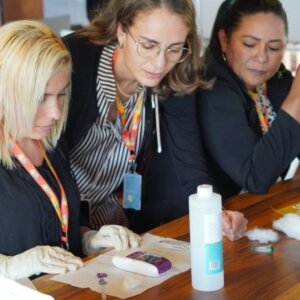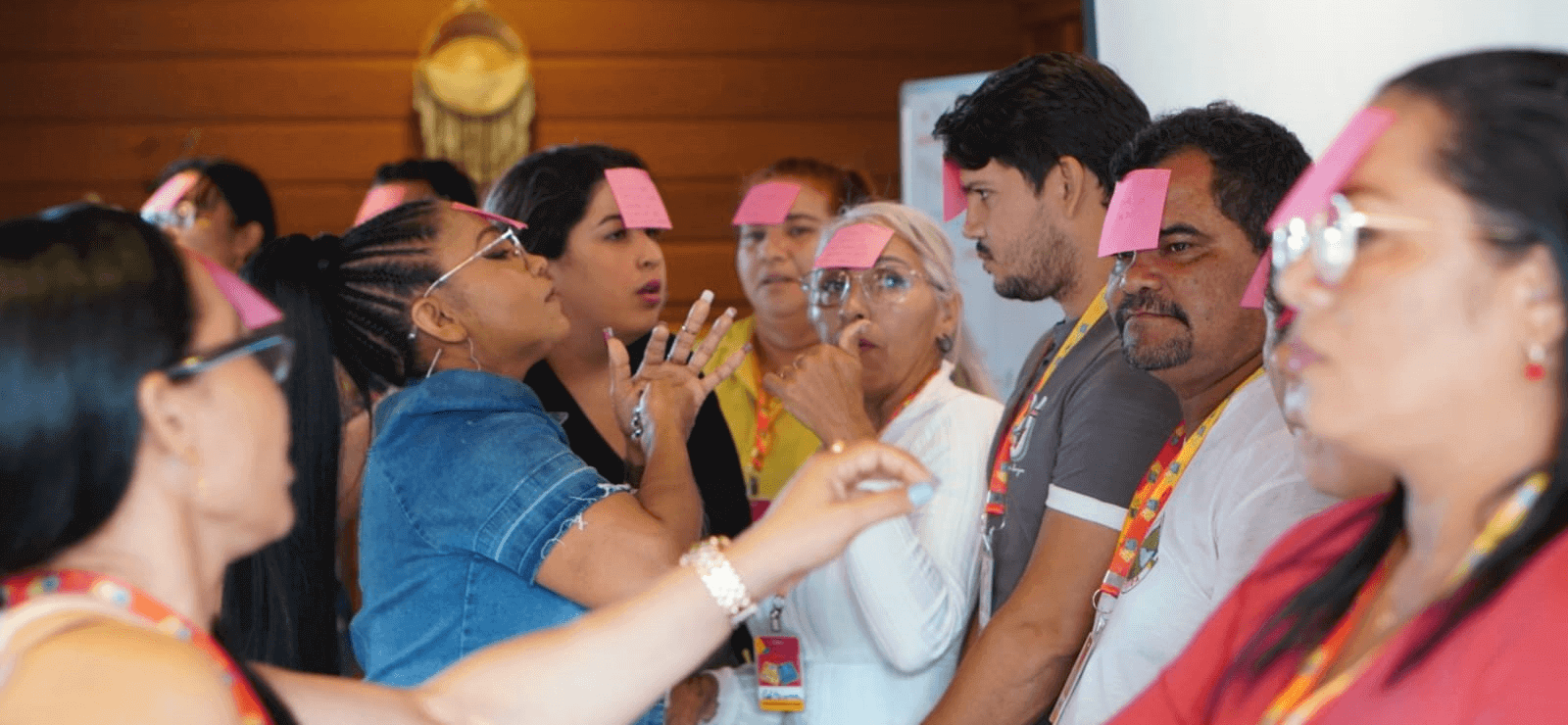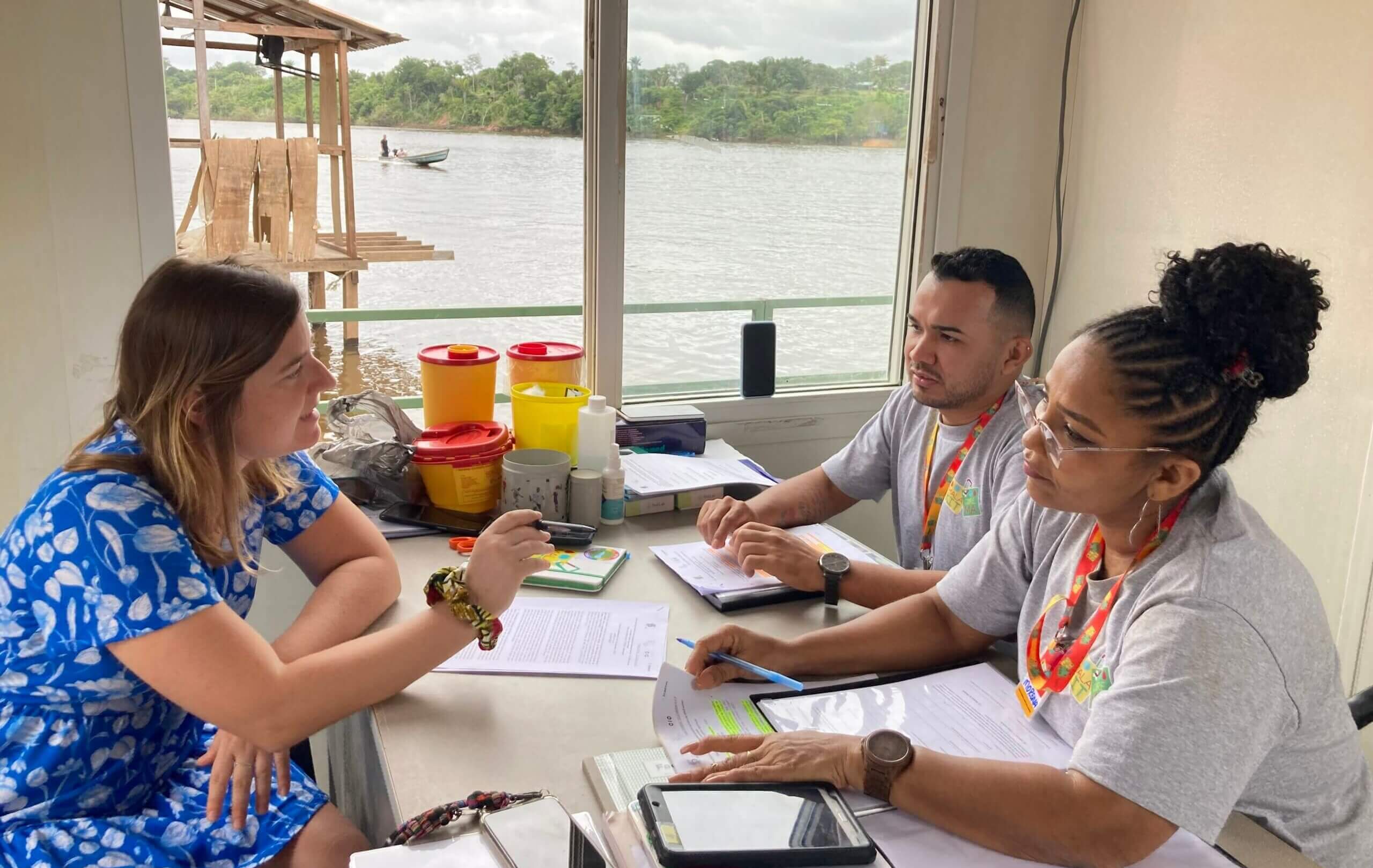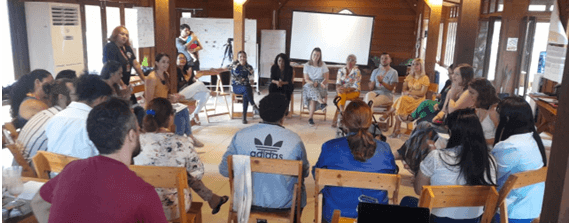“Ha, eu estou curiosa. Assim, e quando você está curioso, você fica querendo saber o resultado. Isso me deu uma vontade para trabalhar com esse projeto. Depois de aprender tanta coisa, despertou mais uma vontade para trabalhar com a malária, saber mais dos garimpeiros e sair conversando com a população.”
I’m curious. And when you’re curious, you want to know the result. That made me excited about working on this project. After learning so much, I want to work on malaria, find out more about the gold miners and go and talk to the local people.
(A facilitator from the Curema project)
The facilitators are the Curema project’s field workers. They are responsible for the training and health education of the participants, the distribution of the kits (malakit and “radical cure”), the delivery of the first dose of “radical cure”, the collection of informed consent, the collection of data via the inclusion questionnaire on the tablet, the follow-up visits to the “radical cure” module, raising awareness in the community, stock management, etc.
To enable them to master the procedures of the study and the principles of health research, the mediators receive multi-stage training before the start of the project.
Basic training

This training covered basic knowledge of malaria (diagnosis and treatment), epidemiology in the Guiana Shield and malaria control strategies.
The basic training sessions took place separately for the mediators working on the inclusion sites in Surinamese or Brazilian territory, due to the different recruitment frameworks, and were provided respectively by the National Malaria Elimination Program in Surinam and by the Oswaldo Cruz Foundation (FIOCRUZ) in Brazil.
Theoretical and practical training course
This 3-week theoretical and practical training course took place in Paramaribo, Suriname. It was run jointly by the entire team of project mediators, with the participation of all those involved in the project, both face-to-face and remotely: the coordination team from the Antilles/Guyana Clinical Investigation Centre – Inserm 1424, the SWOS Foundation, the National Malaria Elimination Program in Suriname, the DPAC association in Brazil and the Oswaldo Cruz Foundation (FIOCRUZ).
The aim was to give them the tools they need to carry out and master all the procedures and actions entrusted to them in the course of their work. To achieve this, the coordinating team developed a dynamic training programme, rich in practical activities, with adapted training tools and based on adult learning theories.
During the training sessions, the mediators practised using the data collection tablet, carrying out the G6PD deficiency screening test, training future participants in the study using a game on malaria transmission and visual explanatory sheets, and obtained the “ICH Good Clinical Practice E6 (R2)” certification provided by The Global Health Network training centre.
“Foi bom, criativo e divertido e bom para memorizar, porque essas coisas a gente memoriza, né? A gente não esquece. Joguinhos foram muito bons.”
It was good, creative and fun and good for memorising, because these things we memorise, right? We don’t forget. Little games were very good.
(A facilitator from the Curema project)
During the training, the facilitators were divided into small working groups. These small groups – used to carry out a large proportion of the practical activities and inclusion simulations – were made up of heterogeneous profiles in terms of skills and personalities in order to maximise results and peer education.
The training also provided an opportunity to adapt the project’s tools to optimise the fieldwork, such as adapting the tablet questionnaire or producing a video of the information note to make it more comprehensible to the participants.
These participative activities helped to increase the commitment of the facilitators by making them the players of the development of their practice.
Continuous training in the field
The facilitators are supported throughout the Curema project by the coordination team and by two supervisors recruited specifically for this activity, one in Suriname and the other in Brazil.
Initially, ongoing training takes place at each inclusion site in the form of support for the mediators while the project is gradually launched in the field and the first inclusions take place.
The coordination team then makes regular supervision visits with the support of the supervisor responsible for the country concerned. This supervision is also supported by remote supervision, with weekly calls and close contact at each inclusion or each doubt via specific WhatsApp groups. The WhatsApp application was chosen because it is the most widely used and easiest to use.
Evaluation of the training
With the aim of gradually improving the project’s procedures, a mixed study was carried out to evaluate the quality and effectiveness of the training offered to the facilitators.
This study, called Evafor, was carried out during the initial theoretical-practical training in Paramaribo and during the first support missions on the field after the official start of the Curema project. Find the publication here!
Several data collection techniques were used:
- A knowledge test before and after the training to assess their level of progress.
- Standardised observations of simulated inclusion and real inclusion in the field.
- A satisfaction test to gather mediators’ perceptions of the format, content, usefulness and implementation of the training sessions, etc.
- A group discussion and in-depth interviews to explore the mediators’ opinions and support the quantitative data collected.




